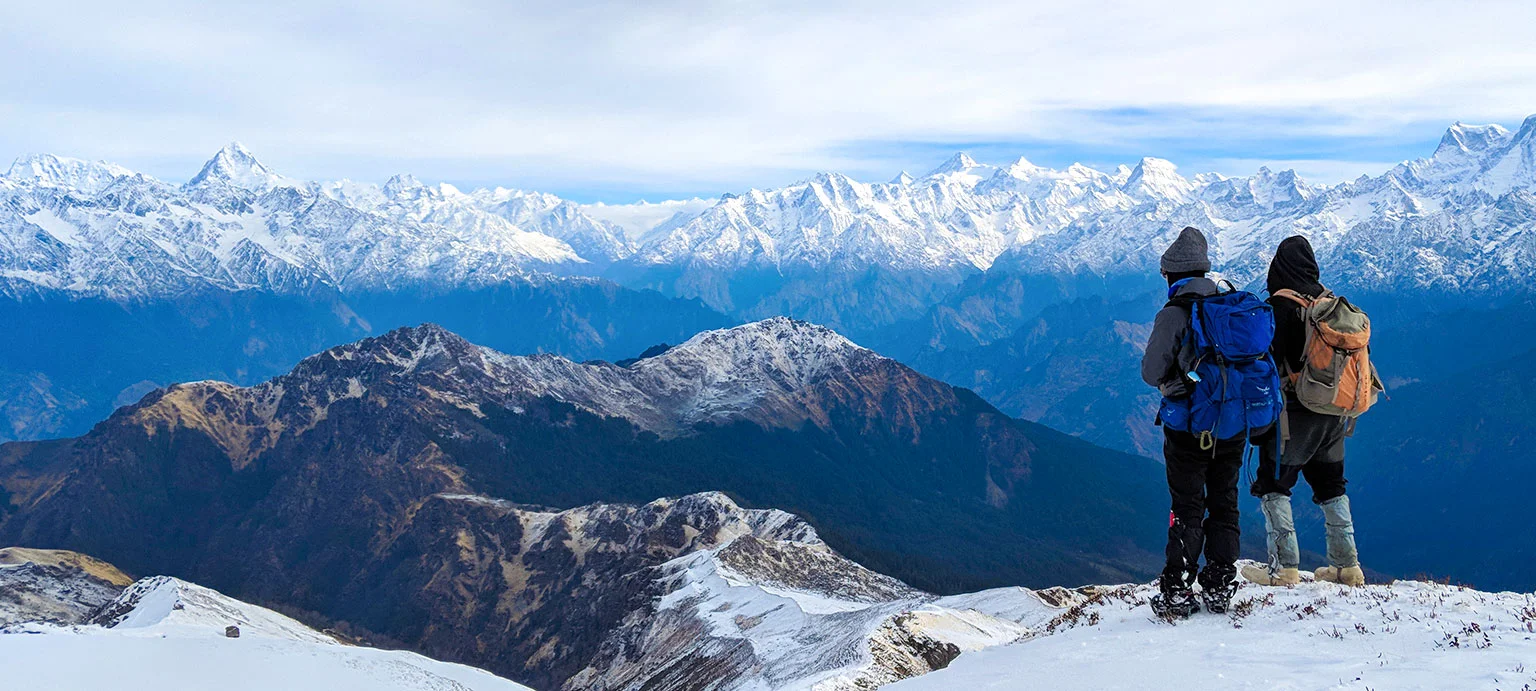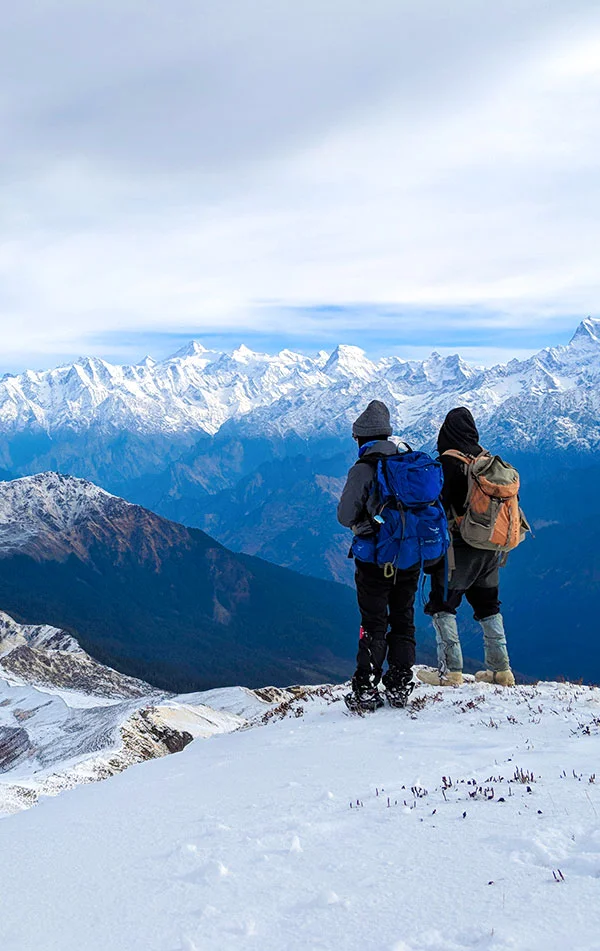
Region
Uttarakhand | India
Duration
7 Days
Max Altitude
15100 Ft.
Trekking Km
43 KM
Grade
Moderate
Help & Support
+91 7351523841 info@trekthehimalayas.com10:00 hrs to 18:00 hrs | GMT +5:30
Monday - Saturday | Sunday Closed
11800 /Person
- April-2024
- +5% GST (goods and services tax)
- Services Pipalkoti to Pipalkoti
- Addons
-
Insurance is Mandatory.
-
Non-Indian rates are slightly higher. Trek coordinator will provide balance payment link post-booking.
- Get insurance through us or elsewhere. If not through us, email for a refund after booking.
-
Cancellation 4 or more days before the start of the trip results in a 100% cash refund.
-
Cancellation less than 4 days from the start of the trip results in no refund.
-
Transportation Rishikesh to Pipalkoti & retun is optional
-
Choose add-ons during booking. If missed, log in and add them later
-
Book transportation at least 10 days before the trek.
-
Cancellation 4 or more days before the start of the trip results in a 100% cash refund.
-
Cancellation less than 4 days from the start of the trip results in a 50% cash refund.
-
Cancellation after the trip date does not qualify for a refund.
-
Backpack offload is optional
-
Choose add-ons during booking. If missed, log in and add them later.
-
Book off-load at least 10 days before the trek.
-
For offline bookings at the base camp, a convenience fee of Rs. 2000 applies.
-
Cancellations made before the trip date will receive a full refund.
Insurance 245
Transport 1600
Offload 1500
For more information. Please complete this form.
Help & Support
+91 991 772 4737info@trekthehimalayas.com 10:00 hrs to 18:00 hrs | GMT +5:30
Monday - Saturday | Sunday Closed
Overview
Trek Name: Pangarchulla Peak Trek
Days: 7
Adventure Type: Trekking
Base Camp: Pipalkoti
Season:Spring |
Month:March | April |
Country: India
Altitude: 15100 Ft.
Grade: Moderate
Rail Head: Rishikesh
Stay: Camping (Twin sharing) & Hotel/Guesthouse
Food: Meals while on trek & at Hotel/Guesthouse (Veg & Eggs)
Location: Uttarakhand
Distance: 43 Km.
Trail Type: Circle trail | Camping in various locations, starting and ending at the same point.
AirPort: Jolly Grant Airport, which is 21 km away from Rishikesh
Highlights:
- +5% GST (goods and services tax)
- Services Pipalkoti to Pipalkoti
Why Pangarchulla Is A Must-Do Trek?
Adorning the Lord Curzon circuit, one of Garhwal Himalaya’s most fabled trails, Pangarchulla- the chimney peak soars to vision. Perched at 14, 700 ft, the peak offers a perfect test of non-technical climbing skills for mountaineering enthusiasts. Though this Uttarakhand trek is accessible throughout the year, it is the winter snow that makes it truly unsurpassable. If thrill is directly proportionate to the gauge of challenge, in the winter would be a journey brave hearts just cannot afford to miss!
Spanning over 7 days, the trek will take you along the pilgrim vein of Uttarakhand, from Rishikesh to Pipalkoti, where we have our base camp. A little further away, from Tugashi village, starts our walking trajectory up the rocky tracks. With ascent, the horizons open up to cliffside villages characterized by terraced farmland and slant-roofed houses, moving on to green meadows surrounded by the signature peaks of the Garhwal Himalayas. Notable are—Nanda Devi, Chaukhamba, Hati-Ghori, and Barmal among others. Part of the Nanda Devi Sanctuary, the trail to Pangarchulla never loses sight of these celebrated peaks and culminates finally at the summit with a gala of glittering snow views.
.webp)
Who Can Participate
-
Age; 12 years +.
-
First timers can apply; previous trekking experience is more appreciated.
-
The climber must be fit and have sufficient stamina to cover 5 km of distance in 30 minutes without stress.
-
The climber should be able to carry a 10-15 kg backpack.
-
Pulse rate at rest must be in between (60 to 90 beats per minute)
-
Blood Pressure Reading must be in between (DIASTOLIC 70 – 90, SYSTOLIC 100 - 140 mm Hg)
-
Respiratory rate at rest must be in between (12 to 20 breaths per minute)
-
Should not have Liver and kidney issues
-
Should not have Diabetes Mellitus, Bronchial Asthma, Heart problems, Hypertension etc
-
No pacemaker implant
-
People with the Sinus issues, Epilepsy please contact to trek coordinator before booking the trek
-
If your BMI is not normal, Please contact our Trek coordinator before Trek booking.
Medical & Disclaimer Form (Mandatory Documents) Click here to download Medical & Disclaimer Form
- Government Employees can avail the benefit of Special Casual Leave (SCL) when you join us for a trekking expedition. As per the rules of the Pay Commission, Special Casual Leave can be availed for up to 30 days in a calendar year for trekking/mountaineering expeditions through a registered organization. Trek The Himalayas is a registered adventure tour operator by Indian Mountaineering Foundation (IMF) and Ministry Of Tourism (MOT)
- Trekkers have to apply for leave at least 20 days before trek departure date,
- This service is exclusive to Indian government employees and is applicable only for treks within India.
- Do mail at info@trekthehimalayas to apply and mention your booked trek date and trek name.
- Junior trekkers (below 15 years) should have a company of parents/guardians.
- Trekkers between 15 to 18 years can come solo with the disclaimer form signed by parent/guardian.
- Medical & Disclaimer Form (Mandatory Documents) Click here to download Medical & Disclaimer Form
Itinerary
Drive From Rishikesh To Pipalkoti | Beginning Of The Journey
The journey commences at Rishikesh. Our representatives will pick you up from Trek The Himalayas office in Rishikesh at 6:00 AM. Even though we have nothing else on our day’s schedule, we will start early. This is because, you need to give your body enough rest before beginning to trek the next day, and secondly, mountain roads are unpredictable so the more time we have in our hands the better.
En route to Pipalkoti, we will follow the course of river Ganga and cross the famous river-bank pilgrim towns of Rishikesh and the 5 Prayags or confluences. The sight of each of these confluences is spectacular. Rishikesh, besides its ambiance of peace, is also known for white-water river rafting.
At Devaprayag, You will get a stunning view of the Bhagirathi river descending into river Alakananda and fusing to form a vivid play of different green hues in the water. The slopes of the mountains along the fiery river look picturesque from the confluence of Devaprayag.
Breakfast and lunch can be found at roadside inns along Badrinath Road and this will be exclusive of the charges you pay for the trek. By 5 pm, at the hour of sundown, we will pull in on the driveway of the Pipalkoti guest house, in time for refreshing hot tea followed by an opening dinner and briefing from your Trek Leader. Mobile network is available at Pipalkoti.
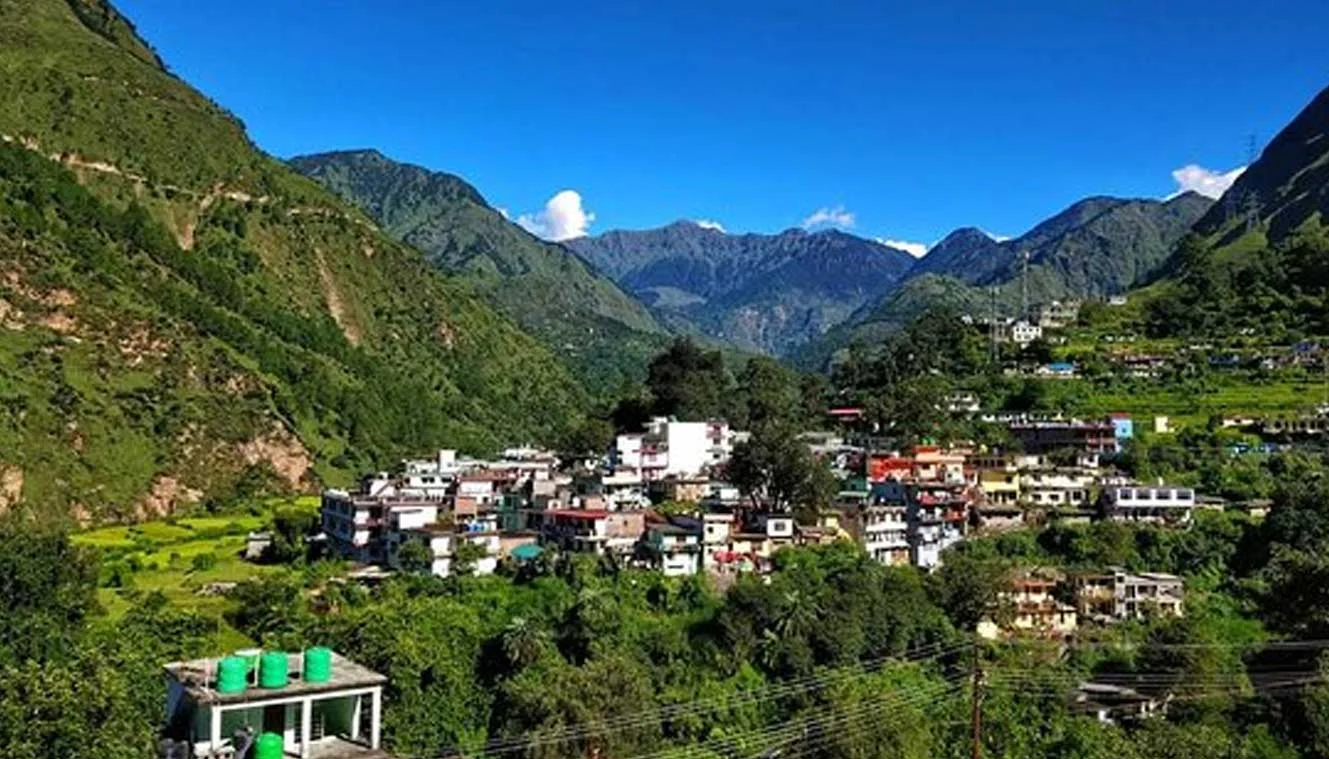
Pipalkoti To Tugashi village And Trek To Gulling Top | Grand Mountain Views
The next day, by 8 am we will set off for Tugashi village after having breakfast at the guest-house. From Tugashi the trek will begin. The drive from Pipalkoti to Dhak of around 1:30 Hours will introduce you to the mountain kingdom surrounding the town. After breakfast, load your rucksack in the van and we will drive towards Tugashi. The drive is short but scenic. Enjoy the first sights of Nanda Devi peak during your ride. Collect your refreshments and start the trek from Tugashi road-head marking the uphill bent towards the destination. Trek for 1 hour to the first village. The first half an hour part of the trek is through a motorable road and then it follows a stone-paved trail up the mountain.
The gradually ascending trail keeps the village on the right and takes a dusty, rocky hike of gradual ascents. You will pass through mountain villages like Kharchi, and Tugasi, giving you a glimpse into the peculiarities of mountain living, their dependence, and their close association with nature. Without any major difficulties, we reach Tugashi village from where the trail inclines by gushing streams. Feast your senses in the greenery of the farming steps cut across hills and the high mountains towering over from all around. The gradual gaining of altitude here must be supported by thorough hydration, therefore, you must keep filling your bottle at village water points. You will come across shepherd clans, farmers, and other agrarian people in this village set in the backdrop of mountains. After immersing in the different flavors of life for some time here, we move towards our next stop- the hamlet of Gulling. During the trek, you can get wonderful sights of Dronagiri Parvat towards the left. This is a popular trek route as it is also the path that takes you to Kuari Pass and a few other treks. You may also see hydro-powered mills in the villages.
With the turn from Tugasi towards Gulling at 8990 ft, the scenario changes from stark and dusty to green. A thickly forested area kicks in after Gulling and traces of civilization start to blur away. The trek continues through forest cover to the Gulling Top campsite at 9600 ft. across 0.5 km from Gulling village. Along with this stretch, finally, the great mesmerizing snow peaks of Garhwal Himalayas pop their heads changing the whole vista to a heavenly one. Prominent in this dazzling panorama are Dronagiri, HathiParvat, and GhoriParvat. You can see widespread Golden Oak, Birch trees on your sides. Remember that the trail takes place inside the Nanda Devi National Park and it is a protected area so be respectful of the inhabitants as well as the flora and fauna of the region. After lunch at the campsite, the sun takes a dip and the snow peaks take a golden sheen casting a spell of pure magic—the perfect time to catch a few exquisite shots! You have gained quite a bit of altitude today, so take short acclimatization walks in the evening around the campsite and return to your camps before dark.
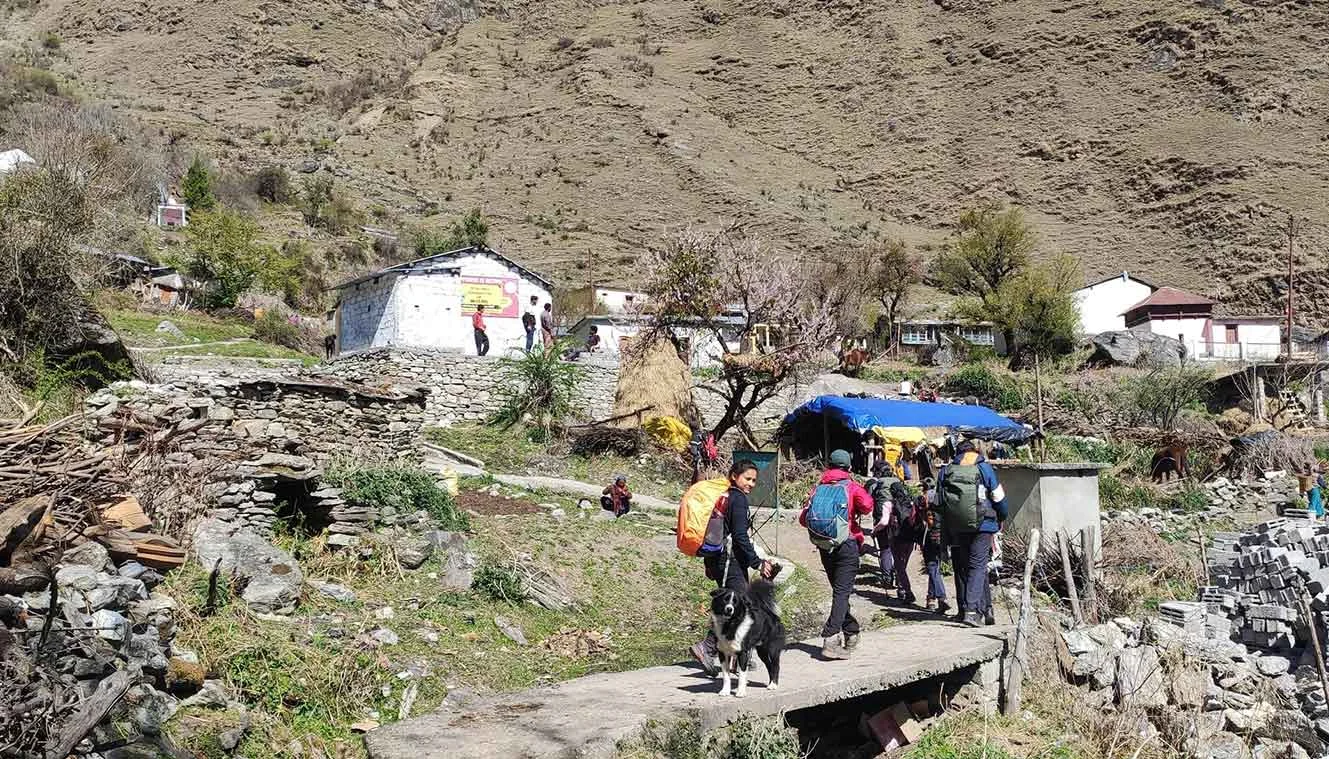
Trek From Gulling Top To Camp I | Walk Through Forested Trails
The next day’s trip is a straight ascent of approx 5 km spanning 4 hours approximately. The destination Camp I is a campsite in the clearing amid coniferous forests of blue pine, oaks, and rhododendron. While the climb is an ascending one, it is not as steep as the previous day’s.
We set out today after breakfast prepared mentally for a moderate hike. There will be numerous water points. The entire trail will be a muddy route. Since the trail is under dense forest cover there is no scope for big mountain sights. You will be surrounded by Oak forests on all sides on most part of today’s walk. Continue along the forested trail to eventually reach Camp I. Greeted with sharp curves with deep ravines gaping at one side, we move along never feeling cheated out of the beautiful vista promised. The forests seem to smile up suddenly here and there with rhododendrons blooming in thickets of pink and red. From a little inside the forested trail, snow becomes part of the scene. Rich growth of Silver Birch and Spruce hovers over the snow-covered forest floor making Pangarchulla an in-depth snow trek. Late into the day, Camp-I is reached. Lunch tastes extra delicious today after this testing trek. The afternoon and evening can be reserved for acclimatization and relaxed walks around the clearing. The acclimatization walk is till Khullara meadows, which takes around 40 minutes to reach there. This will be one of the best walks, with fewer efforts you will be standing in front of an ocean of Kamet, Mana Parvat, Deoban, Hati Parvat, Garud, Trishul, Dronagiri peaks. Khullara Top is a part of Lord Curzon’s Trail and it gives 360-degree views of the Himalayan peaks. After short acclimatization walks, return back to the campsite before sundown. Retire in your tents at night. At higher altitudes, you need to give your body as much rest as possible.
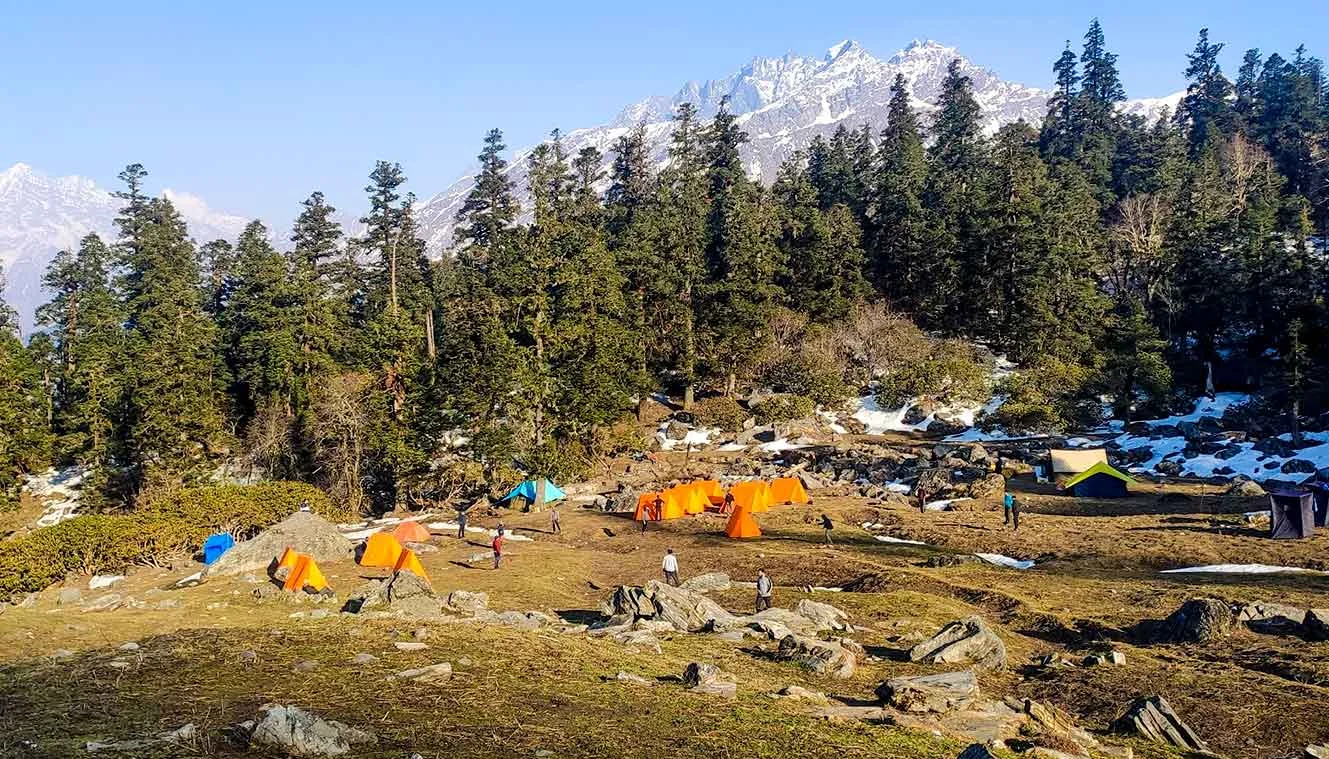
Trek From Camp I To Kuari Pass Via Khullara And Back To Camp I | Acclimatization Walk To Kuari Pass
Starting after breakfast with a packed lunch from Camp I, we make our way, skirting the forest lands towards Kuari Top, and some 40 minutes into the trail, the scenery changes from tree-covered shadowy trails to open meadows. When you reach Khullara top in another 1 hour, you follow Lord Curzon's trail towards Kuari Pass. From Khullara top you can see 3 trails heading out, the right going to Tali downwards, the left uphill trail going to Pangarchulla, left downhill to Kuari Pass. We will take the route to Kuari Pass. Khullara is connected to Lord Curzon’s trail by means of a forest ridge. Keep trudging on the Lord Curzon trail for 20 min and open Gelgad meadows will come into sight. This is another spot to capture the mighty Himalayan peaks like Chaukhamba, Neelkantha, etc. Keep walking for another 20 minutes into the trail and you will encounter the famous broken bridge. Here you can find one water point if luckily it is not frozen. Take a few deep breaths and get ready for a steep ascent until Kuari Pass. For the safe side, keep water bottles with you on this trek.
Watch out for the Pangarchulla on the left as you arrive closer to it. Some of the prominent peaks visible are Chaukhamba, Mt. Kamet, and Neelkantha, Mana, Deoban, Hati Parvat, Garud, Trishul, and Dronagiri.
Have your lunch on the wonderful pass relishing the view and return back to Camp I.
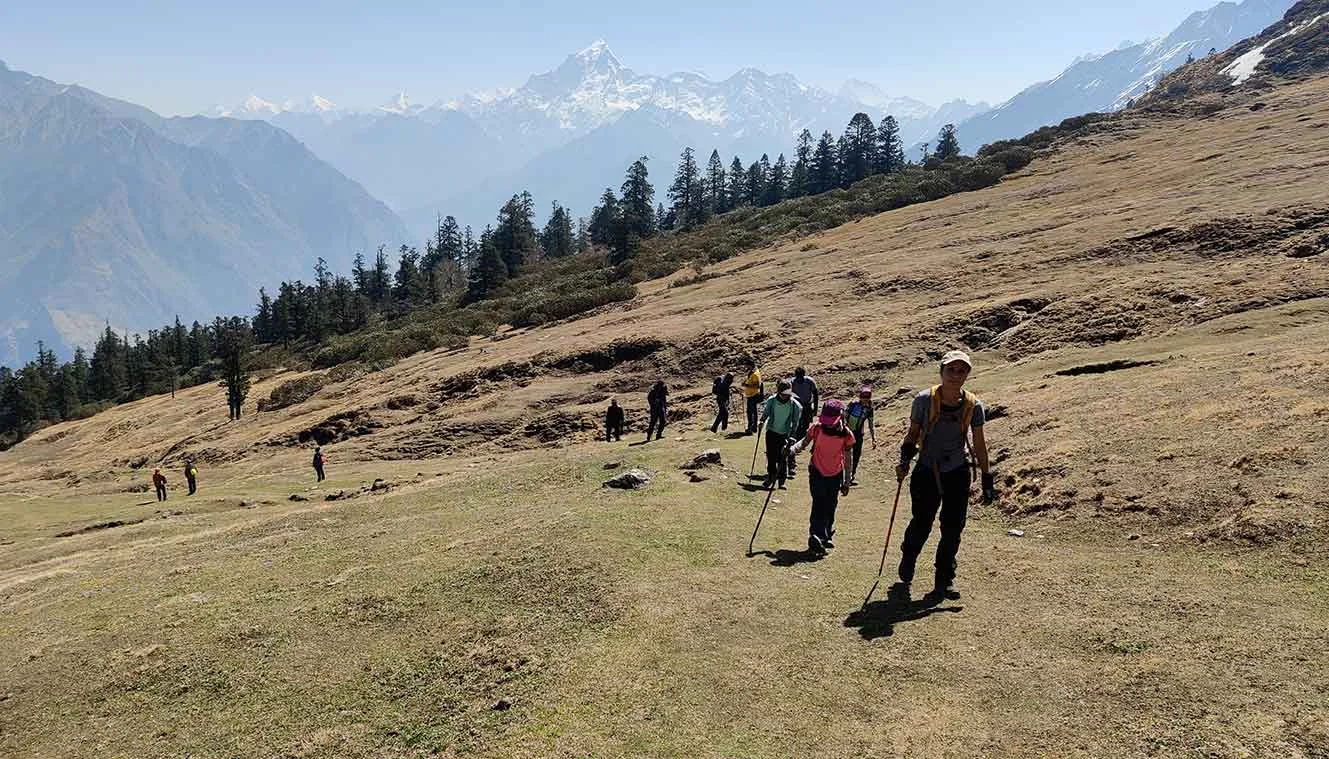
Trek From Camp I To Pangarchulla Summit Via Khullara And Back To Camp I | Summit Day
On this big day, we start early in the morning, at the crack of dawn, and set off on fresh snow for the summit hike. It is necessary to be equipped with at least 2 liters of water as there are no water sources from here. Multiple steep climbing points on the way make this stretch laborious. The trail will be the same till Lord Curzons trail and you will reach here in one and half hours, same as the previous day.
The first 30 minutes of the ascent is a thorough ridge climb which you will know has ended when a vision Pangarchulla Main and auxiliary peaks rise right up ahead. While the climb may be strenuous the fluorescent sunrise on the left will boost your confidence. After the ridge walk, level snow grounds spread ahead giving you a scope to catch your breath. You can observe a snow gully above you in the middle, this is the point you have to reach. For this region and further up, your group may require cutting through the thick carpet of snow manually—an exhaustive task assigned to the one who leads. In May, June the snow usually melts leaving behind a carpet of boulders. Again if there are a few traces of snow, watch out while stepping on the snow. Your foot may go deep sometimes pertaining to the rocks below. Before reaching the base of Pangarchulla Main, enjoy this level snow patch from where you will get a terrific detailed view of the Chaukhamba massif, flanked by Mana, Kamet, Hati-Ghodi, and other snow caps. We request trekkers not to ask for sliding as it is dangerous on these slopes.
Your trek leader will get you all set for rope up. You will be given a choice to continue or stop here. The onward approach to the Pangarchulla Summit is going to be laborious. From the base of Pangarchulla Main Peak, once again comes a steep ridge climb. At about a distance of 100 meters, the knife ridge begins. The knife-edge cut in the middle of the ridge should be avoided as you step. Crampons are highly advisable as they will minimize the chances of slipping on the ice. Expect high squalling wind with currents. We expect to reach the summit by 8 AM, at the most. Any more delays are not allowed because the snow begins to melt, making the reverse trail slippery. On loose snow, the microspikes do not work efficiently. You will have to scale a cluster of 6 mountain ridges to arrive at the summit of Pangarchulla. Sometimes, ice carving with an ice ax is required and our technical team will guide and assist you through the same.
At the summit point, you will come face to face with the Garhwal snow peaks in all their glory, especially Nanda Ghunti on the left, Chaukhamba on right, which will come to the fore for the first time with all the detailed ridge lines revealed. The top is marked by a small temple. From the summit, one gets a 360-degree view of the Garhwal Himalayas, with Nanda Ghunti, Trishuli, Chang Bang, Dronagiri, GarudParvat, Lampak 1,2, Hathi, Gauri, Mana, Kamet on the right and Neelkanth, Chaukhamba, Kedardome, etc. on the left side. After enjoying your victory for 15 minutes we descend and have lunch at the base. The descent takes about 3 to 4 hrs, take care while descending on the snow. From late May to December, the snow melts making it a rocky moraine climb and in these months, it is easier to scale the ridge and takes less time. However, the glorious snow-covered summit is an extraordinary sight to behold.
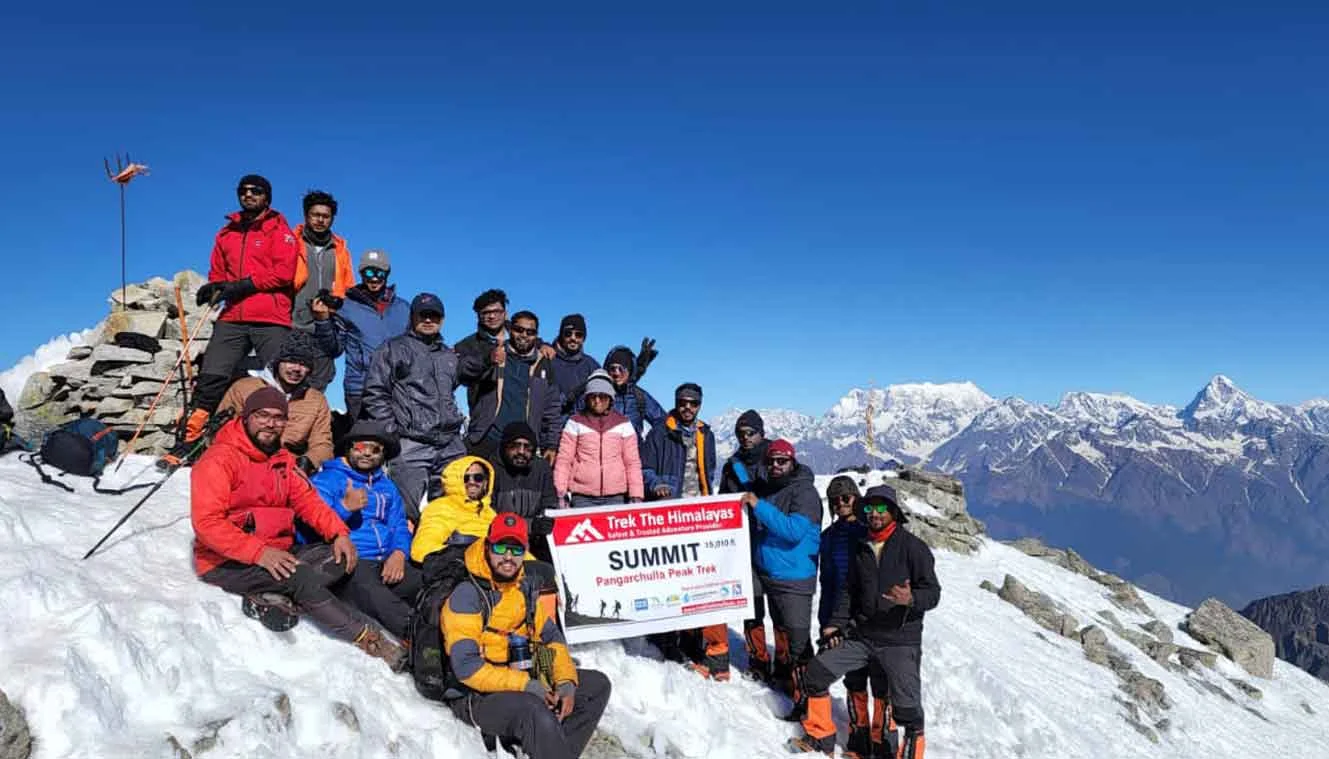
Trek From Camp I To Tugashi Village And Drive To Pipalkoti | Last Day Of Trekking
On the way down from Camp-I, one by one the snow peaks will pop out of view, and the same old village trails will remind you of the end of the journey. It’s an easy trek down to Tugashi village. An hour and a half of trekking through dense forest covers will bring us to our first campsite and another hour and a half, and you will reach Tugashi village From Tugashi, a car ride into the dusk will take you back to civilization at the Pipalkoti guest-house. Dinner and overnight stay in Pipalkoti.
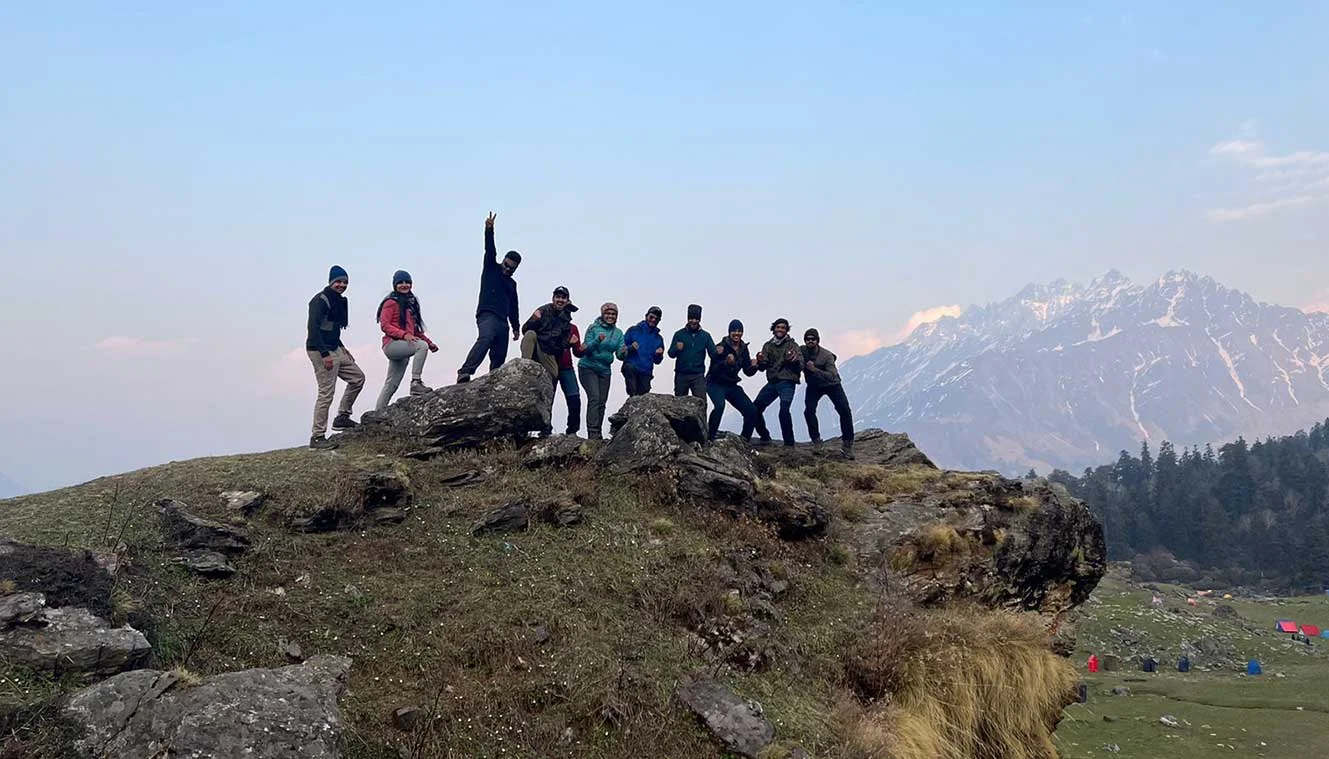
Drive From Pipalkoti To Rishikesh | Bidding Farewell To The Mountains
After sleeping over the unforgettable experience of scaling Pangarchulla, today we go back city-wards. Your car will be waiting at 6 in the morning. Bidding adieu to the gaze of the hills, you will descend down to civilization reaching Rishikesh by 5 in the evening in time for your overnight journey back. Along the journey back from Pipalkoti, Mother Nature will be your constant companion. If you are planning to book your further journey the same day please make the bookings after 7 pm to account for any unexpected delays on the road.
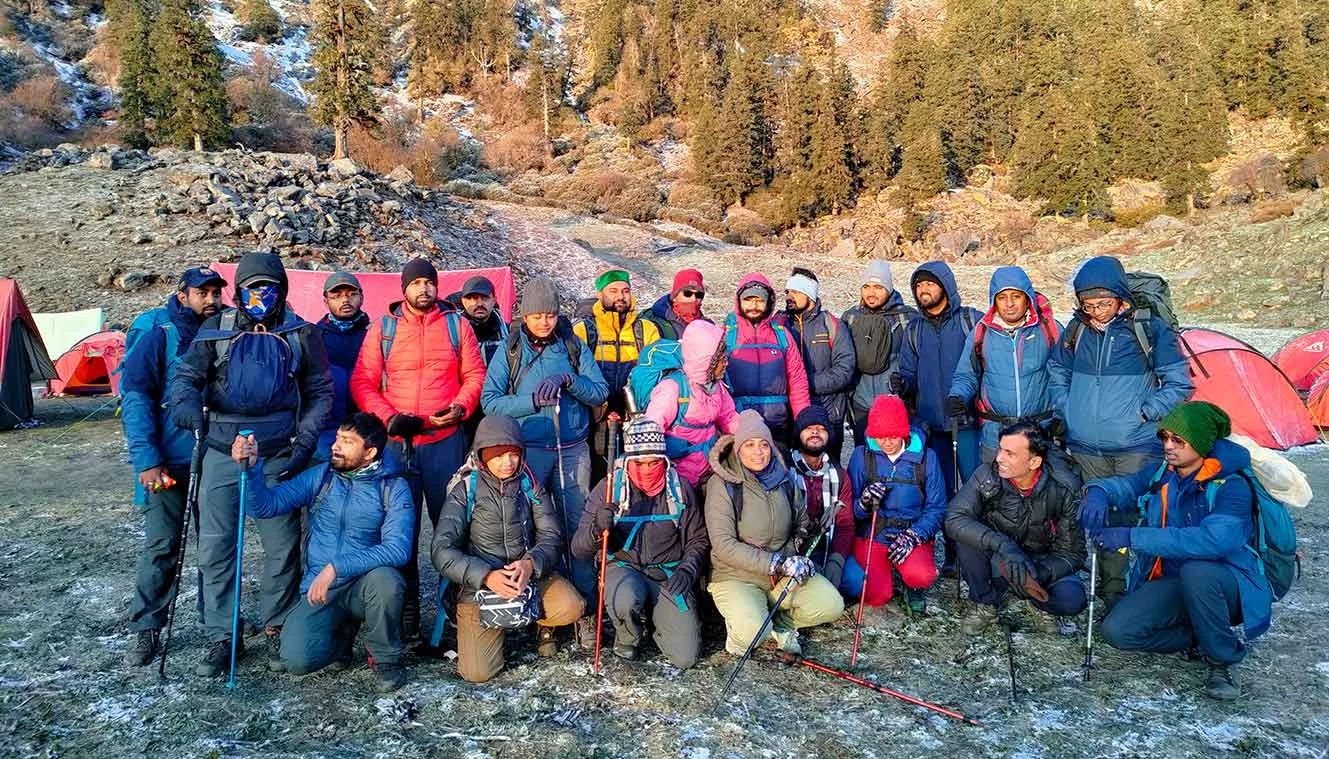
Day-1: Drive From Rishikesh To Pipalkoti | Beginning Of The Journey
- Altitude: 1,900 m/ 6,200 ft.
- Drive Distance: 252 km | Duration: 10 hrs approx.
- Trekkers will be picked from Rishikesh at 6:00 am in a Tata Sumo or a similar vehicle (cost is excluded).
- Arrive at Pipalkoti approx. by 5 pm - (tea, briefing of the trek & dinner).
- Breakfast and lunch on the way (exclusive of charges).
- Accommodation at the guest house.
- Telephone network available.
Day-2: Pipalkoti To Tugashi village And Trek To Gulling Top | Grand Mountain Views
- Altitude: 2,750 m/9,000 ft.
- Drive from Pipalkoti to Tugashi Village is 15 km; Tugashi village to Gulling To is a 3 km trek (2 hrs).
- The trail is a mix of steep and gradual ascents, mostly through villages.
- Hot lunch at campsite.
- Water points available at villages in passing.
- Accommodation in tent.
- Peaks spotted: Dronagiri, Hathi Parvat, Ghodi Parvat.
Day-3: Trek From Gulling Top To Camp I | Walk Through Forested Trails
- Altitude: 3,350 m/ 11,000 ft.
- Trek Distance: 6 km | Duration: 5 hrs.
- Altitude Gain: 600 m/ 2000 ft.
- A steep ascent through Oak, Rhododendron (mostly pink and white), and walnut forest.
- Lunch at campsite.
- Accommodation in tent.
- Peaks spotted: Nanda Devi, Kalanka, Changbang, Dronagiri, Hathi Parvat, Ghodi Parvat.
Day-4: Trek From Camp I To Kuari Pass Via Khullara And Back To Camp I | Acclimatization Walk To Kuari Pass
- Altitude: 3,800 m/ 12,500 ft.
- Approx. 7-8 km trek, 5-6 hrs (3-4 km away).
- The first half is a steep ascent and the second half is a gradual ascent.
- Wide meadows with golden to bright green grass cover to cross in the summer that turns into rolling snowfields in the winter.
- Khullara top to a broken ridge with frozen stream (traverse walk) (3,700 m/ 12,200 ft).
- Broken bridge to Kuari Pass (strenuous climb) (3,800 m/ 12,500 ft).
- Carry enough water (no water source on the way).
- Early morning breakfast and start trek to Kuari Pass.
- Special care for protection from the harsh sun is required in these open meadows.
- Peaks spotted: Kedrantah Peak, Kedardome, Chaukhambha, Balakun, Neelkantha, Mukut Parvat, Kamet, Abhi Gamin, Mana I, Ghodi Parvat, Hathi Parvat, Dronagiri, Kalanka, Changbang, Nanda Devi and Nanda Ghunti.
Day-5: Trek From Camp I To Pangarchulla Summit Via Khullara And Back To Camp I | Summit Day
- Altitude: 4,600 m/ 15,100 ft.
- Trek Distance: 14 km | Duration: 10 - 11 hrs.
- Challenging and steep climb.
- Start trekking at 3:00 am as turnaround time is 8:00 am.
- Peaks spotted: Nanda Ghunti, Trishul, Nanda Devi, Kalanka, Changbang, Dronagiri, Hathi Parvat, Ghodi Parvat, Mana, Kamet, Abl Gamin, Neelkanth, Chaukhamba Massif, and many more.
Day-6: Trek From Camp I To Tugashi Village And Drive To Pipalkoti | Last Day Of Trekking
- Altitude: 1,900 m/ 6,200 ft.
- Trek Distance: 5 km | Duration: 5 hrs.
- Drive Distance: 30 km to Pipalkoti.
- Breakfast at Camp I.
- Trek to Tugasi village.
- Drive from Tugasi village to Pipalkoti.
- Packed lunch on the way.
- Reach Pipalkoti by late evening.
- Pipalkoti (tea, debriefing, dinner).
- Clean drinking water for filling your bottles will be available at Tugasi village.
- Accommodation: guesthouse.
Day-7: Drive From Pipalkoti To Rishikesh | Bidding Farewell To The Mountains
- Drive DIstance: 252 km.
- The ride will commence at 6 am, reaching the destination at around 6 pm.
- Breakfast and lunch will be on the way at a roadside inn, exclusive of charges.
Note: On day 7, you will reach Rishikesh between 5 and 6 pm. You can book your further travel after 7 pm.
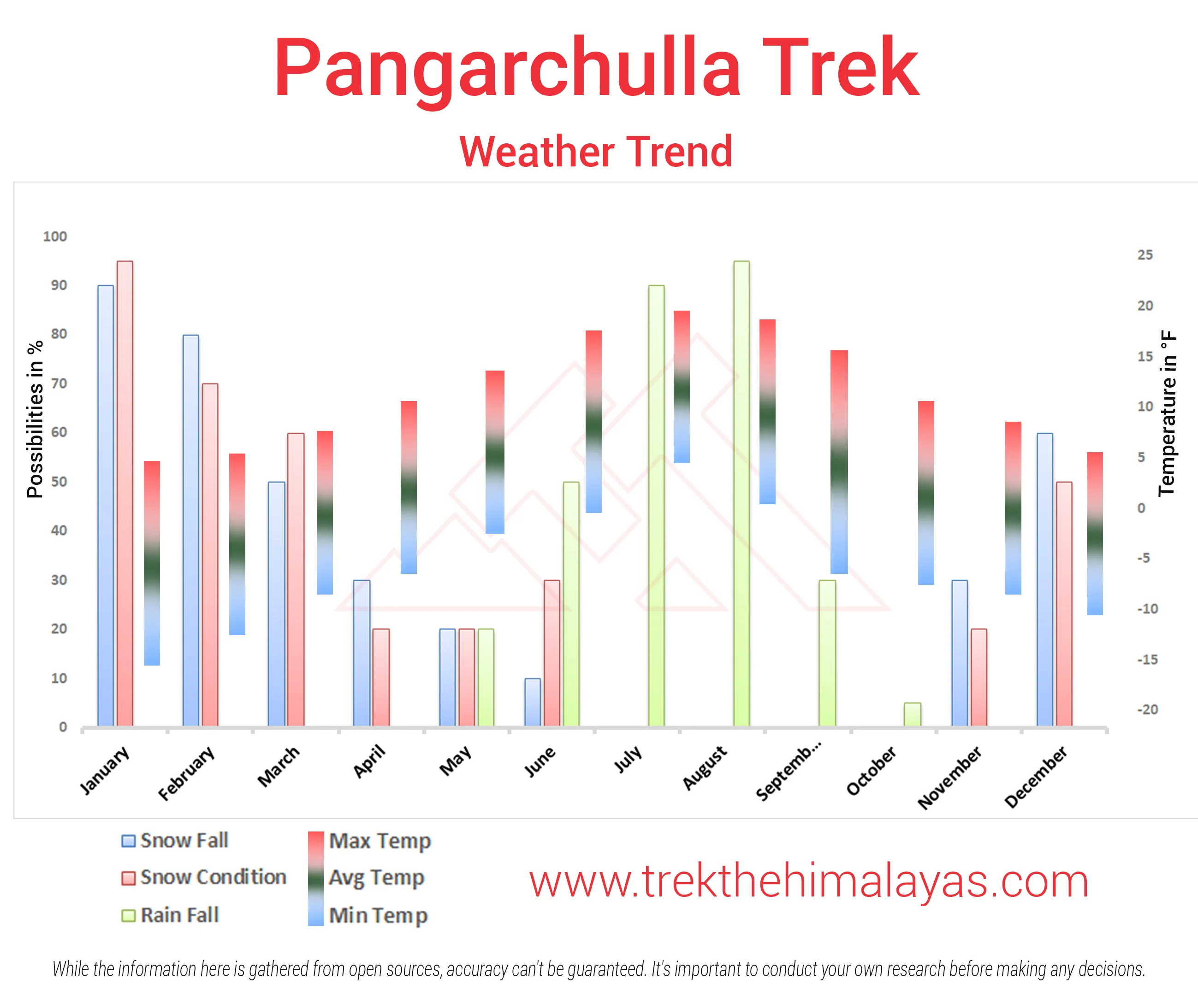
Important Links
- Mandatory Documents to Bring on A Trek Click Here.
How To Reach
It is essential for everyone to arrive at Rishikesh (06:00 am)
Trek The Himalayas Head office, Tapovan Laxmanjhula, Landmark -Nainital Bank opposite Shiv Vilas Hotel
Once you have reached Rishikesh, TTH will manage the rest of your travel arrangements, if you have opted for TTH's pick-up service, you can select this option during the booking process by adding it as an add-on.
Options to reach Rishikesh
- Take overnight train/bus to Rishikesh.
- Take overnight train/bus to Haridwar and drive to Rishikesh (35 min drive with normal traffic).
We always recommend going for the govt. Buses over the private ones outside the bus station as based on the experience we have found that there are very high chances of delay involved with private buses. Also, govt. Buses are always more reliable. Whichever bus you choose, just make sure to reach Rishikesh at least by 05:30 am.
3. Board a flight to Dehradun airport (Jolly Grant Airport) (21 km, 30 min). If you're arriving by air, then come one day in advance.
If you prefer to travel independently to Base camp and don't want to take TTH's pick-up service, you can either take a government bus or book a private cab from Rishikesh. Your trek coordinator will provide guidance on how to arrange for the bus or cab booking.
Arrive in Rishikesh by 3:00 to 4:00 pm.
The designated drop-off point is Trek The Himalayas Office (Tapovan | Laxmanjhula).
Please consider planning your subsequent travel arrangements after 7:00 pm.
TTH offers comfortable transportation through Tempo Traveler, Bolero, or equivalent vehicles. If you wish to upgrade your mode of transportation, please contact your trek coordinator for further assistance.
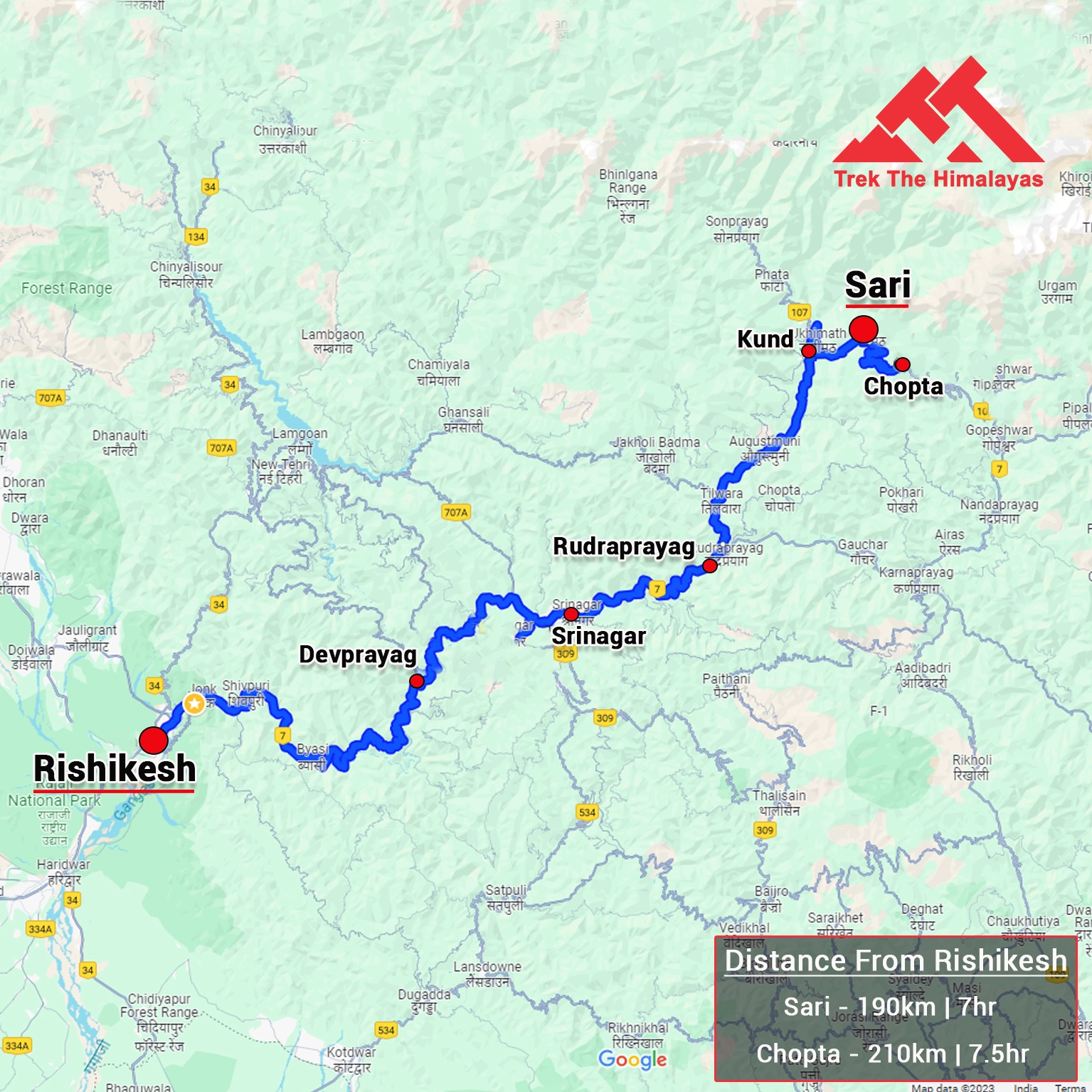
Cost Terms
Inclusion
1. Accommodation (as per the itinerary):
- Guest house (sharing basis).
- Camping while the trek (Twin sharing basis).
2. Meals (Veg + Egg):
- All meals while on trek.
3. Support:
- 1 Versatile base camp manager: handles communication and deploys extra manpower in emergencies.
- 1 Mountaineering & First aid qualified professional trek Leader.
- 1 Experienced high altitude chef.
- Local experienced guides (Number of guides depending on the group size).
- Enough support staff.
4. Trek equipment:
- Sleeping bag, Sleeping liners (if required), Mattress, Utensils.
- 3 men all season trekker tent (twin sharing), Kitchen & Dining tent, Toilet tent.
- Camping stool, Walkie talkie.
- Ropes, Helmet, Ice axe, Harness, Gaiters & Crampon (if required).
5. First aid:
- Medical kit, Stretcher, Oxygen cylinder, Blood pressure monitor, Oximeter, Stethoscope.
6. Transportation (as per the itinerary):
- Transport Rishikesh to Pipalkoti and return.
7. Mules/porters to carry the central luggage.
8. Clock room facility available at the base camp for additional luggage.
9. All necessary permits and entry fees, Upto the amount charged for Indian.
Exclusion
1. Insurance (Mandatory).
2. Food during the transit.
3. Any kind of personal expenses.
4. Mule or porter to carry personal luggage.
5. Emergency evacuation, hospitalization charge or etc.
6. Anything not specifically mentioned under the head Inclusion.
7. Transport cost.
Things can be provided on demand and availability (participant has to pay extra for these things).
1- Satellite phone/set phone - is a type of mobile phone that connects via radio links via satellites orbiting the Earth instead of terrestrial cell sites like cellphones. Therefore, they can operate in most geographic locations on the Earth's surface.
2- Gamow/PAC HAPO Bag (Portable Hyperbaric Bag) - is a unique, portable hyperbaric chamber for the treatment of acute mountain sickness (AMS), also known as altitude sickness.
3- AEDs (Automated External Defibrillators) - are portable life-saving devices designed to treat people experiencing sudden cardiac arrest, a medical condition in which the heart stops beating suddenly and unexpectedly.
Cancellation terms:
Cancellations prior to 25 days from the start of the Trip
Refund options
- 5% deduction of trek fee
- 100% cash voucher for any trip till one year
- Transfer your trek (any trek, any date) to your friend
Cancellation between 24 days and 15 days to the start of the Trip
Refund options
- 30% deduction of trek fee
- 100% cash voucher for same trip till one year
- 85% cash voucher for any trip till one year
- Transfer your trek (same trek, any date) to your friend
Cancellation between 14 days and 10 days to the start of the Trip
Refund options
- 50% deduction of trek fee
- 80% cash voucher for same trip till one year
- 70% cash voucher for any trip till one year
- Book the same trek, in the same season, with any other batch
- Transfer your trek (same trek, any date) to your friend
Cancellation less than 9 days to the start of the trek
Refund options
- No cash refund
- 20% cash voucher for the same trip till one year
- 10% cash voucher for any trip till one year
- Transfer your trek (same trek, same date) to your friend
Note- If a booking is made using a voucher or discount code, the policies related to vouchers and discounts cannot be modified.
In the unlikely event that TTH cancels a trek prior to the scheduled departure date:
While it is extremely rare for TTH to cancel a trek, we understand that unforeseen circumstances or natural disasters may occasionally require us to do so before the scheduled departure. These circumstances could include continuous rain or snow, thunderstorms, snowstorms, landslides, floods, earthquakes, or any other natural calamity that poses a risk to the safety of our trekkers. Additionally, unforeseeable events such as local riots, curfews, pandemics, lockdowns, government orders, or any similar situations that compromise the safety of the trekking experience may also necessitate a cancellation.
In the event of such a cancellation, TTH will provide you with a voucher equivalent to the amount you paid for the trek. This voucher can be redeemed for any of our treks within the next year, allowing you to still enjoy an adventure with us at a later date.
Note
-
The issuance of a voucher is not applicable in situations where you are required to descend from the trek for any reason. The trek leader may make the decision to send you down from the trek due to factors such as insufficient fitness level, symptoms of Acute Mountain Sickness (AMS), high blood pressure, exceeding the designated turn-around-time, health concerns, or if you are found smoking, drinking, or violating the rules set for the trek. In such cases, the provision of a voucher does not apply.
In the rare event that TTH shifts a trek:
We would like to emphasize that weather conditions in high-altitude areas are highly unpredictable and can undergo sudden changes at any time, irrespective of the day. Additionally, circumstances beyond our control, such as natural disasters, political unrest, pandemics, and lockdowns, may impact the feasibility of conducting a trek. In cases where we are unable to proceed with an event due to such circumstances that are beyond our direct control, we will make every effort to provide you with an alternative trek that is safer and more suitable.
In such situations, we will issue a voucher to offset the cost difference between the originally scheduled trek and the alternative trek. This voucher can be redeemed at any time within one year from the date of issue. Please note that a refund fee or reimbursement of the cost difference is not applicable in these cases.
Note:
- Change of trek batch is dependent on the availability of seats in the batch
- In case of transferring a trek to a friend, he/she should satisfy all the mandatory requirements put forward by TTH
- TTH holds the right to change/cancel the policies, without prior notice
- Cash refund is applicable only in case of bookings made without using any promotional offer code or vouchers
Cash Voucher Terms:
- This is a non-transferable voucher
- The voucher cannot be merged with any other offer of Trek The Himalayas
- The voucher is valid for Trek booked directly with Trek The Himalayas in India
- To avail the voucher please use your register phone number or e-mail id
- All the other Terms of booking a trek with Trek The Himalayas are applicable to the voucher
- Trek The Himalayas holds rights to add/remove any of the Terms and Conditions without prior notice
Itineraries are based on information available at the time of planning and are subject to change. "Trek The Himalayas" reserves the right to change expedition dates, people or itineraries as conditions warrant. If a trip must be delayed or the itinerary changed due to bad weather, road conditions, transportation delays, government intervention, airline schedules, sickness, or other contingency for which TTH or its agents cannot make provision, the cost of delays and/or other changes are the responsibility of the participant. TTH reserves the right to decline, or accept, any individual as a trip member for any reason whatsoever.
Trek Essentials
PDF Of Trek Essential Download
| Backpack with rain cover | (50 - 60 ltr) with comfortable shoulder straps |
| Day pack with rain cover | 20 - 30 ltr (If off-load opted) |
| Walking stick | Advisable (At least one) |
| Water Bottle / Hydration pack | 2 bottles of one liter each, People who use hydration pack 1 hydration pack and 1 bottle of one liter, Carry at least one thermos flask. |
| Small size tiffin/lunch box | 1 Nos |
| Snacks | Energy bars, dry fruits, electoral/ors |
| Personal Medical Kit | Consult your doctor |
| T-Shirt (Synthetic quick dry) | 1 Full & 2 Half sleeves |
| Fleece T-shirt | 1 Nos |
| Wind stopper / Fleece jacket | 1 Nos |
| Windproof Jacket | 1 Nos |
| Down feather / Hollow jacket | 1 Nos |
| Thermal inner (Upper and Lower) | 1 Pair |
| Trek Pant (Synthetic quick dry) | 2 Nos |
| Wind stopper / Fleece Pant | 1 Nos |
| Waterproof gloves | 1 Pair |
| Fleece / woollen gloves | 1 Pair |
| Poncho / waterproof Jacket and pant | 1 Nos |
| Sunscreen | 1 Nos |
| Moisturiser | 1 Nos |
| Chap-stick / Lip balm | 1 Nos |
| Toothbrush and toothpaste | 1 Nos |
| Toilet paper & Wipes | 1 Nos |
| Soap / hand sanitizers | 1 Nos |
| Antibacterial powder | 1 Nos |
| Quick dry towel | 1 Nos |
| Head torch | 1 Nos. (Avoid Hand torch) |
| Sun Cap | 1 Nos |
| Woolen cap | 1 Nos. |
| Balaclava | 1 Nos. |
| Buff / Neck-gaiters | 1 Synthetic & 1 Woollen |
| Sunglasses | UV with dark side cover, People who wear spectacles - (A)- Use contact lenses | (B)- Photo chromatic glasses |
| Trekking shoes | 1 Pair (Waterproof, high ankle, good grip) |
| Floaters / flip-flops | 1 Pair |
| Cotton socks | 6 pairs |
| Woollen socks | 1 pairs |
| Gaiters | 1 Pair (TTH provides when required) |
| Micro spikes | 1 Pair (TTH provides when required) |

Frequently Asked Questions(FAQ)
To register with TTH, visit our website - www.trekthehimalayas.com and create your account. To create your account you will need to use your email address and fill in all the details, set your unique password and your account is ready to use.
- To book a trek with TTH, you first need to register with us and create an account.
- Choose the trek that you want to do and click on available dates.
- You will land at the login page, fill in the required details.
- Add Participants, choose add-on services click on the Pay now button, choose your preferred payment method, and make the payment. TTH accepts multiple payment options, including credit/debit cards, net banking, and UPI.
- You will receive a confirmation email from TTH with all the necessary details about the trek, including the meeting point, transportation, accommodation, and other important instructions.
please send an email to us at info@trekthehimalayas.com or reach out to the numbers provided in the Help and Support section of your Trek Page. We will ensure that your issue is promptly resolved.
To book services such as off-load luggage and transportation, you can find them listed as add-ons. These additional services can be booked at the time of your initial booking. If you miss booking add-ons during the initial reservation, you can log in anytime and easily book 4 days before the departure date add-ons through the platform.
In such a situation, please log in to your account and transfer your trek or date to the desired one within 12 hours or drop us an email at info@trekthehimalayas.com 10 days before the departure date of the trek. After the initial 12-hour period, any changes will be processed according to the cancellation policy.
We recommend visiting our "Suggest Me a Trek" page. By filling out the form, our experts will contact you with the best possible trek options based on your preferences and experience level. Alternatively, you can reach out to us via email at info@trekthehimalayas.com or give us a call using the numbers provided on our website for personalized assistance and recommendations.
Family treks differ from regular treks by focusing on ease of difficulty, offering shorter durations for younger participants, Kid-friendly and easily digestible foods, child-friendly activities, maintaining a higher guide ratio for diverse age groups, and implementing additional safety measures for families.
Family Trek with Kids recommendation Only Dayara Bugyal and Chopta Chandrashila Trek.
Minimum age for TTH treks is typically 7 years, though this may vary depending on the specific trek.
Yes, you can take a kids to a high-altitude trek with a parent. Discuss with a trek expert before booking a trek.
Junior trekkers (below 15 years) should have a company of parents/guardians.
Trekkers between 15 to 18 years can come solo with the disclaimer form signed by parent/guardian.
Medical & Disclaimer Form (Mandatory Documents) Click here to download medical and disclaimer form
Physical Fitness: Ensure your child is physically fit. Engage them in regular exercise, outdoor activities, and hikes to build stamina and endurance. Hydration: Emphasize the importance of staying hydrated at high altitudes. Encourage your child to drink water regularly, even if they don't feel thirsty. Proper Nutrition: Provide a well-balanced diet with sufficient carbohydrates for energy and foods rich in iron to prevent altitude sickness. Adequate Sleep: Ensure your child gets enough sleep in the days leading up to the trek. Quality rest is crucial for altitude adaptation. Educate on Altitude Sickness: Teach your child about the symptoms of altitude sickness, such as headache, nausea, and dizziness. Encourage them to communicate any discomfort immediately. Appropriate Clothing and Gear: Dress your child in layers to adjust to changing temperatures. Ensure they have appropriate trekking gear, including sturdy footwear. Positive Mindset: Foster a positive mindset. Encourage your child, and let them know it's okay to take breaks when needed. Medical Check-Up: Schedule a medical check-up before the trek to ensure your child is fit for high-altitude activities. Consult with a healthcare professional about any potential health concerns.
TTH takes special care to provide wholesome and nutritious food for children on treks. Here are some of the foods that are typically served for children:
Breakfast: For breakfast, TTH serves a variety of options like porridge, cornflakes, bread, butter, jam, honey, boiled eggs, omelettes, and pancakes. Children can choose from these options to fuel themselves for the day's trek.
Lunch: For lunch, TTH serves lunch which includes rotis, vegetables, rice, dal, and salad. The rotis are usually made fresh on the trek and are a good source of carbohydrates. The dal and vegetables provide protein and other essential nutrients.
Snacks: TTH provides healthy snacks like fresh fruits, dry fruits, energy bars, cookies, and biscuits to keep the children energized throughout the day.
Dinner: For dinner, TTH serves a hot and wholesome meal which includes soup, rice, dal, vegetables, and a non-vegetarian dish (if requested in advance). Children can also choose from a variety of desserts like custard, jelly, and fruit salad.
Dietary requirements: If a child has any special dietary requirements, TTH can cater to those needs as well. For example, if a child is lactose intolerant or allergic to nuts, the kitchen staff can make arrangements to accommodate those requirements.
Choosing the right trek for a beginner can be a bit overwhelming as there are many factors to consider such as distance, elevation gain, terrain difficulty, weather, and time of year. Here are some tips that can help you choose the right trek for a beginner:
1. Determine fitness level: Assess the fitness level of the beginner to understand their physical capabilities. This will help you select a trek that is challenging but not too difficult.
2. Choose a well-traveled trail: A well-traveled trail will have more amenities such as signposts, water stations, and shelter. It is also safer as there will be other hikers on the trail.
3. Consider the length of the trek: For beginners, it is recommended to start with a shorter trek that can be completed in a day or two. This will help them get acclimatized to trekking and build their confidence.
4. Look for gradual elevation gain: Choose a trek with a gradual elevation gain rather than steep ascents. This will make the trek easier and more enjoyable.
5. Check the weather: Check the weather forecast before selecting a trek. Avoid treks during the monsoon season or winter when the trails can be slippery or dangerous.
6. Research the trail: Read about the trail to get an idea of the terrain, altitude, and difficulty level. This will help you select a trek that is suitable for the beginner.
7. Consult with an expert: If you are unsure about which trek to choose, consult our trek expert Mr. Nitin (+91 70600 59773) between 10 AM to 6 PM (Tuesday - Friday). Mr. Nitin will provide you valuable advice and guidance.
Overall, it is important to choose a trek that is enjoyable, challenging but not too difficult, and suitable for the beginner's fitness level and experience.
It is not recommended for a beginner to choose a difficult Himalayan trek. Trekking in the Himalayas can be physically and mentally challenging, especially if you are not used to the high altitude, steep slopes, and rugged terrain. Choosing a difficult trek without the proper experience, fitness level, and preparation can be dangerous and put you at risk of altitude sickness, injury, and other hazards.
If you are a beginner, it is recommended to start with an easier trek and gradually build up your skills and experience. This will help you understand the challenges of trekking in the Himalayas, and also prepare you physically and mentally for a more difficult trek in the future. It is also important to choose a trek that matches your fitness level, experience, and interest.
There is no specific age limit for a beginner trekker. However, it is important to consider your physical fitness, health condition, and personal interests before embarking on a trek. Trekking in the Himalayas can be physically and mentally demanding, and requires a certain level of physical fitness and endurance.
If you have any pre-existing medical conditions or are above a certain age, it is recommended to consult with a doctor before embarking on a trek. It is also important to listen to your body and take breaks as needed during the trek to prevent exhaustion or injury.
We recommend visiting our "Suggest Me a Trek" page. By filling out the form, our experts will contact you with the best possible trek options based on your preferences and experience level. Alternatively, you can reach out to us via email at info@trekthehimalayas.com or give us a call using the numbers provided on our website for personalized assistance and recommendations.
Yes, you can join the trek. We have fixed departure groups where you can simply book your trek and we will take care of curating a group.
Before you start the trek, it is recommended that you make all the necessary phone calls as during the trek you may or may not receive network coverage, once you come back to the Base Camp, you can reconnect with your family via phone once again. You can share your trek coordinator contact detail with your family members to get the latest updates about your trek batch.
At TTH, we provide wholesome and nutritious meals during the trek. The food is vegetarian and includes a variety of dishes such as rice, dal, vegetables, chapati, paratha, pasta, noodles, and soup. We also offer snacks such as biscuits, and salty, and dry fruits during the trek. Special dietary requirements such as vegan, gluten-free, or Jain food can also be arranged if informed in advance.
If you are allergic to some foods, you need to let us know in advance so that we can make arrangements accordingly.
TTH is a trekking company that prioritizes the safety of all its participants, including women trekkers. They have a comprehensive safety system in place, which includes a dedicated team of experienced and trained trek leaders and support staff who are equipped to handle emergency situations and provide first aid.
TTH also takes specific measures to ensure the safety and comfort of women trekkers. They have a separate tent accommodation for women trekkers, female trek leaders, and support staff. They also provide separate toilet facilities for women and encourage a safe and respectful environment for all trekkers.
Moreover, TTH has a strict policy against any kind of harassment and has a zero-tolerance policy towards such incidents. They have a designated Internal Complaints Committee (ICC) to investigate and address any complaints related to harassment or misconduct. Overall, TTH has a good reputation for safety and responsible trekking practices, and women can feel comfortable and safe while trekking with them.
In case you are the only women in the group, we provide a single sleeping arrangement. Also, during the trek, the trek leader will always remain by your side to provide optimum safety and reassurance.
You can reach out to the trek coordinator to inquire about the number of female trekkers and their respective states who have booked the trek. Please note that the trek coordinator cannot disclose personal details of any trekker. Once you've confirmed your booking, a WhatsApp Group will be created for all the trekkers in your batch. This allows you to connect with fellow trekkers before the trek begins.
While many of our treks are led by female trek leaders, however, it is not possible to know which trek leader is assigned to which group. But nonetheless, whether the trek leader is male or female you can be completely assured of your safety and security with us.
Yes, it is possible to trek with periods. However, it is important to take some extra precautions and preparations to ensure a comfortable and safe trekking experience.
Here are some tips that can help you trek during your period:
1. Use menstrual hygiene products that you are comfortable with, such as tampons, pads, or menstrual cups. It is recommended to carry enough supplies for the entire duration of the trek.
2. Pack wet wipes, hand sanitizer, and plastic bags to dispose of used hygiene products.
3. Wear comfortable and breathable clothing that allows for easy movement and reduces friction. Avoid wearing tight or restrictive clothing that can cause discomfort.
4. Carry pain relief medication, such as ibuprofen or acetaminophen, in case of menstrual cramps.
5. Stay hydrated and maintain a balanced diet to support your energy levels and overall health.
6. Take breaks as needed and listen to your body. If you feel uncomfortable or experience any unusual symptoms, seek medical attention immediately.
It is also recommended to consult with a doctor before going on a trek during your period, especially if you have a pre-existing medical condition or are taking medication. By taking necessary precautions and being prepared, you can have a safe and comfortable trekking experience even during your period.
We provide proper disposal facilities for sanitary pad disposal during the trek.
We offer three person tents with twin-sharing for optimum comfort. A woman trekker will share a tent with another woman trekker and if you are the only woman in the group, you will be given a single accommodation for your comfort and privacy.
Yes, we do provide gears on rent. You can book it using you TTH account directly.
Mountaineering qualified Experienced and first aid certified Trek Leader, First Aid Certify local guide, Cook, helpers and supporting staff.
People suffering from Bronchitis, Asthma, High blood pressure, Epilepsy (got faints), TB , Heart problem or on higher BMI side are strictly not allowed to go on any Himalayan trek. Apart from this if you had any medical history, please let us know.
No. Alcohol and smocking isn’t allowed while on trek. It is totally misconception that it will keep you warm. Your body need to acclimatize properly and for that eat properly and drink enough water; these things will keep you warm.
Toilet tents provide a convenient solution for answering nature's call in the great outdoors. Dry toilets, in particular, offer a highly sanitary approach. By digging a pit and utilizing mud and a shovel, you can easily cover up your waste. This method ensures cleanliness and hygiene while camping or exploring in the forest.
Remember to pack essential toiletries to complete your outdoor bathroom kit and maintain proper personal hygiene during your adventures. With these practices in place, you can enjoy nature while also respecting it.
Layer Up From Head To Toe
Eat Full Meals, never sleep empty stomach
You can keep warmee (if you’re more susceptible to cold).
Use sleeping bag in right way and don’t leave free space in sleeping bag.
For upper body
– Thermal layer
– T-shirt (full-sleeves)
– Fleece T-shirt (for extreme colds)
– Fleece layer
– Thick Jacket/Down Jacket
– Waterproof or Windproof layer (outermost layer, when it is snowing or raining)
- For Lower Body
– Thermal layer
– Hiking pants (normal) or Winter hiking pants
Based on how warm you feel you can skip any of the above layers. Your outer later should be windproof since it is windy at high altitude.
The idea behind layering is that the more insulation you have the less cold you feel, and instead of wearing a very thick jacket if you wear multiple layers, your body will be better insulated against the cold.
Yes, we provide micro spikes and gaiters, if required.
Mandatory documents: 2 xerox of ID having address (addhar card/driving license), 2 Passport size photographs, hard copy Medical form signed & sealed by doctor, disclaimer form sign by trekker and high altitude insurance.
No. We don’t but we can suggest you good hotel/Stay nearby pick up location.
Yes, trekker must carry 2 water bottles 1 litre each so they can refill it at campsite for drinking and keep themselves hydrate.
You should buy shoes which has these three features –Good grip, Ankle Support and additional water resistant layers. Generally, we advise Quechua Trek 100, MH 500 and MH 100.
Your return transport is also included in trek fee if you're opting for service Dehradun to Dehradun ; we use Tempo Traveller/ Tata Sumo/Max/Boloero kind of vehicle.
No one is forced to go on. There is always enough staff to split the party according to need and regroup later at the camp. Most people have no trouble reaching the highest campsite. If some members decide not to climb the final distance they can wait for the climbers to come back down the same way or take a lateral path to the descent route.
We always have a first aid kit close at hand. Serious injuries are rare. Porters will assist injured climbers to the base of the mountain and onward to a clinic or hospital. Kilimanjaro International Airport is very near Marangu Gate if evacuation to the US or Europe is advisable.
The Pangarchulla Peak is a high-altitude trek in the Joshimath region of Chamoli district in Uttarakhand.
The altitude of Pangarchulla Peak Trek is approximately 15,100 ft.
The trek to Pangarchulla starts from Pipalkoti village.
Pangarchulla Peak Trek is a moderate-grade trek.
The best time to do Pangarchulla Peak Trek is during the spring months from mid-Feb to mid-Apr.
Pangarchulla Peak Trek is a 7-day long trek.
Trek The Himalayas follows this route: Pipalkoti - Tugasi - Gulling Top - Camp I - Pangarchulla Summit - Camp I - Tugasi - Pipalkoti - Rishikesh.
During the Pangarchulla Peak Trek, you will stay in a guest house in the base camp, and on the slopes, you will be staying in tents (twin-sharing).
The highlights of Pangarchulla Peak Trek include the grand mountain views of Trishul, Nanda Devi, Chaukhamba, and Kedarnath.
Yes, it is recommended to have prior trekking experience before attempting the Pangarchulla Peak Trek as it is considered a moderately difficult trek. The trail involves steep ascents and descents, and the altitude can also be a challenge. It is important to have good physical fitness and stamina to complete the trek comfortably. Prior trekking experience can help you to be better prepared for the challenges of the trek, such as acclimatization, managing your energy levels, and dealing with the rugged terrain. However, if you are in good physical condition and have a positive attitude, with proper guidance and preparation, you can still attempt the Pangarchulla Peak trek even if you are a beginner.
Yes, it is highly recommended to hire a professional expert for the Pangarchulla Peak Trek, especially if you are a beginner or have limited trekking experience. A professional can provide you with valuable assistance, including knowledge of the local terrain, weather conditions, and the culture of the region. They can also help you with navigation and ensure your safety throughout the trek.
Hiring a porter is optional, but it can be helpful if you do not want to carry a heavy backpack during the trek. A porter can carry your luggage and equipment, allowing you to trek more comfortably and at your own pace.
